'There's a hole in the system. Israel became a haven for suspected Jewish sex offenders.'
Ha'aretz
Dina Kraft
2 April 2019
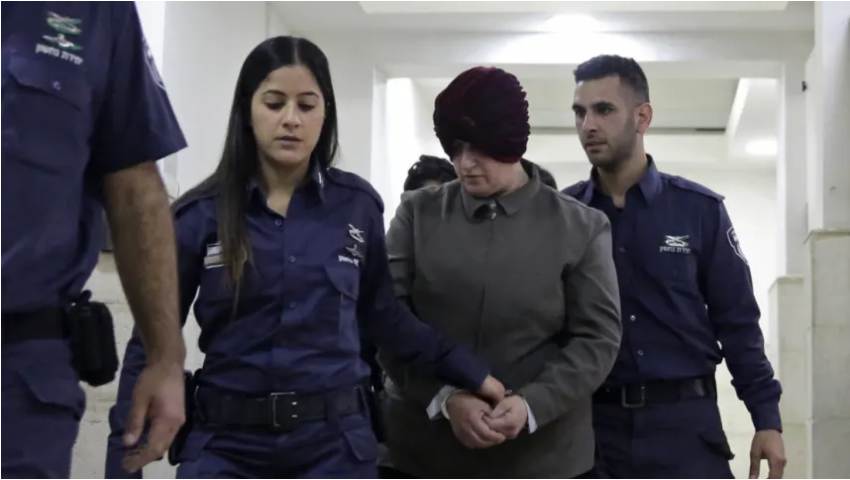 Malka Leifer is facing possible extradition on 74 counts of suspected sexual abuse. She was the headmistress of an ultra-Orthodox girls’ school in Melbourne and fled to Israel in 2008 Credit: Mahmoud Illean/AP
Malka Leifer is facing possible extradition on 74 counts of suspected sexual abuse. She was the headmistress of an ultra-Orthodox girls’ school in Melbourne and fled to Israel in 2008 Credit: Mahmoud Illean/AP
The case of Malka Leifer, one of 65 suspected sexual offenders allegedly seeking refuge in Israel, has highlighted how Israeli law and the insular world of the ultra-Orthodox can at times shield them from justice, activists and prison officials tell Haaretz
Y. grew up the 13th of 14 children in a Hasidic family where money and parental attention were in short supply. He says that when he was 12, a rabbi who taught at his New York state yeshiva sexually abused him.
The trauma he still lives with began with the teacher buying him ice cream and later invitations home for lunch — seeming kindnesses that, Y. alleges, morphed into sexual abuse.
Years passed, but when he was 27, Y. (Haaretz is in possession of his real name) says he saw his alleged abuser again when he came to Y.’s father’s shivah. Something snapped inside. Y., now 38, recalls feeling a surge of rage and approaching the rabbi. “If I did not forget, you still remember,” he recalls telling him.
When Y. then started making his allegations known within the community, he says the rabbi moved to Israel. Activists say the man eventually got a job in Jerusalem, again teaching boys, until they made the accusations against him public.
Also in New York state, A., 29, alleges that an older cousin started abusing him when he was 6 and the cousin was also a minor. The two were part of the Chabad community and in 2013, A. won a U.S. lawsuit against his cousin, who was ordered to pay him $3.5 million in damages. But A. says his alleged abuser immigrated to Israel after the decision, aided by some of their joint relatives and some members of the community, and the damages were never paid.
“More than half of my life has included dealing with the fallout from what this person did to me,” A. tells Haaretz. “He never had to answer to anyone for the harm he inflicted on me and was protected by our community and even by members of my own immediate family. Despite this, and despite the pressure that has been placed on me to just ‘move on,’ I took every step possible to get justice and I’m proud of that decision — despite the steep price I paid for it."
Exploiting a law
One of Israel’s foundational laws is the Law of Return, which gives Jews the right to immigrate to Israel and become citizens — unless they are deemed a danger to Israeli society, security or the Jewish people. Israeli law, however, does not define what that means.
According to advocates for victims of child sex abuse, it is the exploitation of this law that has potentially made the country an unintentional haven for Jewish alleged sex offenders who flee here.
This issue of Israel becoming a haven, for those seeking citizenship or those who already have it, has taken center stage with the high-profile case of Malka Leifer. The headmistress of an ultra-Orthodox girls’ school in Melbourne fled to Israel in 2008 after allegations surfaced of her sexually abusing several of her female students. Leifer is facing possible extradition to Australia on 74 counts of suspected sexual abuse, including indecent assault of a minor and rape.
“The Law of Return is basically why it’s so easy for people to come here,” says Shana Aaronson, the chief operating officer of Jewish Community Watch — an advocacy group for victims of child sexual abuse everywhere in the Jewish world, with offices in the United States and Israel.
“There is certainly more focus on whether or not the person is Jewish than there is on a possible criminal record,” she charges, alleging that criminal background checks run on individuals looking to immigrate are not as thorough as they should be.
Y. grew up the 13th of 14 children in a Hasidic family where money and parental attention were in short supply. He says that when he was 12, a rabbi who taught at his New York state yeshiva sexually abused him.
The trauma he still lives with began with the teacher buying him ice cream and later invitations home for lunch — seeming kindnesses that, Y. alleges, morphed into sexual abuse.
Years passed, but when he was 27, Y. (Haaretz is in possession of his real name) says he saw his alleged abuser again when he came to Y.’s father’s shivah. Something snapped inside. Y., now 38, recalls feeling a surge of rage and approaching the rabbi. “If I did not forget, you still remember,” he recalls telling him.
When Y. then started making his allegations known within the community, he says the rabbi moved to Israel. Activists say the man eventually got a job in Jerusalem, again teaching boys, until they made the accusations against him public.
Also in New York state, A., 29, alleges that an older cousin started abusing him when he was 6 and the cousin was also a minor. The two were part of the Chabad community and in 2013, A. won a U.S. lawsuit against his cousin, who was ordered to pay him $3.5 million in damages. But A. says his alleged abuser immigrated to Israel after the decision, aided by some of their joint relatives and some members of the community, and the damages were never paid.
“More than half of my life has included dealing with the fallout from what this person did to me,” A. tells Haaretz. “He never had to answer to anyone for the harm he inflicted on me and was protected by our community and even by members of my own immediate family. Despite this, and despite the pressure that has been placed on me to just ‘move on,’ I took every step possible to get justice and I’m proud of that decision — despite the steep price I paid for it."
Exploiting a law
One of Israel’s foundational laws is the Law of Return, which gives Jews the right to immigrate to Israel and become citizens — unless they are deemed a danger to Israeli society, security or the Jewish people. Israeli law, however, does not define what that means.
According to advocates for victims of child sex abuse, it is the exploitation of this law that has potentially made the country an unintentional haven for Jewish alleged sex offenders who flee here.
This issue of Israel becoming a haven, for those seeking citizenship or those who already have it, has taken center stage with the high-profile case of Malka Leifer. The headmistress of an ultra-Orthodox girls’ school in Melbourne fled to Israel in 2008 after allegations surfaced of her sexually abusing several of her female students. Leifer is facing possible extradition to Australia on 74 counts of suspected sexual abuse, including indecent assault of a minor and rape.
“The Law of Return is basically why it’s so easy for people to come here,” says Shana Aaronson, the chief operating officer of Jewish Community Watch — an advocacy group for victims of child sexual abuse everywhere in the Jewish world, with offices in the United States and Israel.
“There is certainly more focus on whether or not the person is Jewish than there is on a possible criminal record,” she charges, alleging that criminal background checks run on individuals looking to immigrate are not as thorough as they should be.
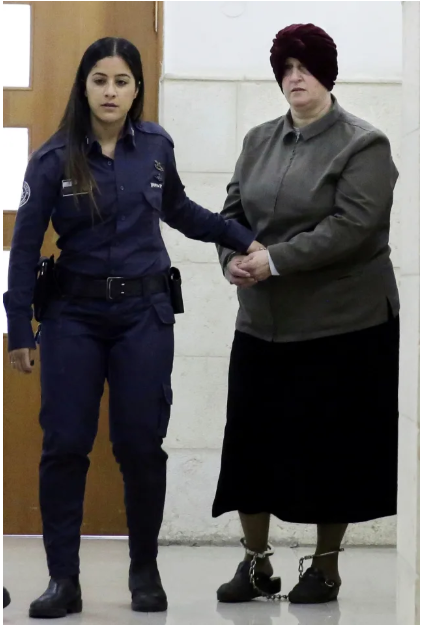 FILE: Malka Leifer is brought to a courtroom in Jerusalem, Tuesday, Feb. 27, 2018. Credit: Mahmoud Illean / AP
FILE: Malka Leifer is brought to a courtroom in Jerusalem, Tuesday, Feb. 27, 2018. Credit: Mahmoud Illean / AP
Interior Ministry spokeswoman Sabine Haddad tells Haaretz that, in order to act, Israel is reliant on information tipping it off about a potentially dangerous applicant for immigration, such as an alert by an international crime-fighting organization.
And if a convicted sex offender manages to immigrate to Israel, officials say there is no legal way for Israel to impose supervision — which would often be mandatory if they were still living in their home country — unless they are convicted of reoffending in Israel.
‘A hole in the system’
Jewish Community Watch says Leifer and Y.’s alleged abuser are among 65 people in the last decade, most of them either ultra-Orthodox or Orthodox Jews, who they know fled to Israel. They were either already Israeli citizens, began the immigration process here, or came and stayed here on tourist visas. Though they say it is impossible to be precise about the number of convicted or alleged child sex offenders seeking refuge in Israel, they believe about half of those 65 faced criminal charges concerning sexual abuse of children or have seen proceedings started against them in their home countries. The other half have been accused by alleged victims but not prosecuted.
However, the Jewish Agency, which helps facilitate the aliyah process for many potential immigrants, counters that its staff conducts what it calls “extensive background research on applicants.” Every year, it says, cases are found where some of the applicants have lied and their applications rejected, although it could not say precisely how many were found to be lying in any specific year.
The Israeli police do not keep data on such alleged child sex offenders, making it nearly impossible to verify their number.
Aaronson says that of those alleged offenders who have faced criminal proceedings, some have served time and others took plea deals that included parole time in their home country or state — where they were supposed to be monitored by local police under the terms of their probation.
It is illegal for those on parole to leave their country of residence. Others, as a condition of their release or plea deal, may have been ordered to be registered on a sex offenders list. However, according to Aaronson, as long as registered sex offenders provide a forwarding address, they are legally allowed to move.
“The problem is the forwarding address given in Israel in such cases is never accurate, in my experience,” she says. “And the U.S. Registry is powerless to enforce that in Israel, because it’s beyond its jurisdiction.”
When any such individual is in Israel, the Israel Prison Service (which oversees parolees) says there is no monitoring unless the person is convicted of a crime in the Jewish state. “If the individual was never a prisoner in our system, there is no supervision,” prison service spokesman Assaf Librati tells Haaretz. “It’s a hole in the system — and it’s truly problematic.”
New victims
One child sex offender who did serve time in Israel, the prison service confirmed, is Jimmy Julius (Yosef) Karow. According to Interpol, he has both U.S. and Israeli nationality and is wanted for two counts of sexual abuse in the United States. According to JCW and a February 2018 report by Israel’s Channel Ten News, he immigrated to Israel from the United States between 2000 and 2001 and eventually moved into an ultra-Orthodox settlement in the West Bank. He was arrested, charged and convicted of assaulting young girls in Jerusalem and served five years for those crimes.
The Karow case, advocates say, highlights how offenders or even alleged offenders can find new victims in Israel.
In recent months, additional allegations against Leifer have emerged. In February, Australia’s Seven News aired an interview with a father in Immanuel — the Jewish settlement in the West Bank where Leifer had been living — in which he claimed Leifer had been abusing his daughter. And Israel’s Channel 11 reported the same month that a woman has come forward alleging that Leifer abused her when she was a student at an ultra-Orthodox girls’ school in Bnei Brak over 20 years ago.
And if a convicted sex offender manages to immigrate to Israel, officials say there is no legal way for Israel to impose supervision — which would often be mandatory if they were still living in their home country — unless they are convicted of reoffending in Israel.
‘A hole in the system’
Jewish Community Watch says Leifer and Y.’s alleged abuser are among 65 people in the last decade, most of them either ultra-Orthodox or Orthodox Jews, who they know fled to Israel. They were either already Israeli citizens, began the immigration process here, or came and stayed here on tourist visas. Though they say it is impossible to be precise about the number of convicted or alleged child sex offenders seeking refuge in Israel, they believe about half of those 65 faced criminal charges concerning sexual abuse of children or have seen proceedings started against them in their home countries. The other half have been accused by alleged victims but not prosecuted.
However, the Jewish Agency, which helps facilitate the aliyah process for many potential immigrants, counters that its staff conducts what it calls “extensive background research on applicants.” Every year, it says, cases are found where some of the applicants have lied and their applications rejected, although it could not say precisely how many were found to be lying in any specific year.
The Israeli police do not keep data on such alleged child sex offenders, making it nearly impossible to verify their number.
Aaronson says that of those alleged offenders who have faced criminal proceedings, some have served time and others took plea deals that included parole time in their home country or state — where they were supposed to be monitored by local police under the terms of their probation.
It is illegal for those on parole to leave their country of residence. Others, as a condition of their release or plea deal, may have been ordered to be registered on a sex offenders list. However, according to Aaronson, as long as registered sex offenders provide a forwarding address, they are legally allowed to move.
“The problem is the forwarding address given in Israel in such cases is never accurate, in my experience,” she says. “And the U.S. Registry is powerless to enforce that in Israel, because it’s beyond its jurisdiction.”
When any such individual is in Israel, the Israel Prison Service (which oversees parolees) says there is no monitoring unless the person is convicted of a crime in the Jewish state. “If the individual was never a prisoner in our system, there is no supervision,” prison service spokesman Assaf Librati tells Haaretz. “It’s a hole in the system — and it’s truly problematic.”
New victims
One child sex offender who did serve time in Israel, the prison service confirmed, is Jimmy Julius (Yosef) Karow. According to Interpol, he has both U.S. and Israeli nationality and is wanted for two counts of sexual abuse in the United States. According to JCW and a February 2018 report by Israel’s Channel Ten News, he immigrated to Israel from the United States between 2000 and 2001 and eventually moved into an ultra-Orthodox settlement in the West Bank. He was arrested, charged and convicted of assaulting young girls in Jerusalem and served five years for those crimes.
The Karow case, advocates say, highlights how offenders or even alleged offenders can find new victims in Israel.
In recent months, additional allegations against Leifer have emerged. In February, Australia’s Seven News aired an interview with a father in Immanuel — the Jewish settlement in the West Bank where Leifer had been living — in which he claimed Leifer had been abusing his daughter. And Israel’s Channel 11 reported the same month that a woman has come forward alleging that Leifer abused her when she was a student at an ultra-Orthodox girls’ school in Bnei Brak over 20 years ago.
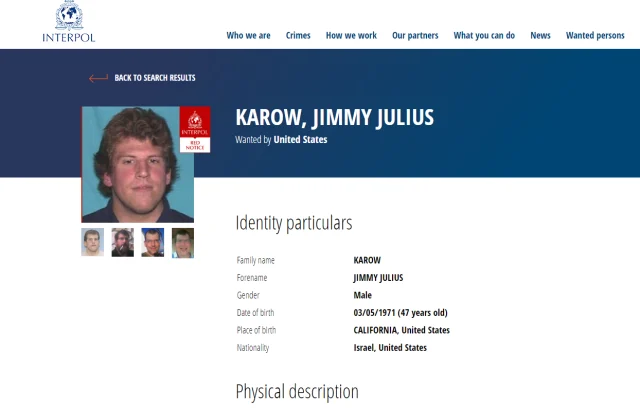 Wanted by Interpol: Jimmy Julius (Yosef) Karow Credit: Screen capture / Interpol.int
Wanted by Interpol: Jimmy Julius (Yosef) Karow Credit: Screen capture / Interpol.int
Asked for comment about the new allegations, Leifer’s lawyer, Yehuda Fried, told Haaretz: “We do not intend to relate to rumors and gossip, and certainly to acts that apparently occurred many years ago.”
Leifer’s story became headline news in Israel again when it was reported in February that Israel’s deputy health minister, Yaakov Litzman — who, like Leifer, is ultra-Orthodox — had been questioned under caution by the Israel Police over suspicions that he tried to use his influence, including the use of threats, to get state psychiatrists to have Leifer declared mentally unfit for trial (in order to block her extradition). Litzman has denied any wrongdoing.
Her lawyer said that Leifer has not been convicted of any crimes, and that since the Litzman story broke, “an aggressive campaign has been initiated in the media by interested parties,” which has been “distorting facts.”
He added: “All the experts, and especially the psychiatrists in the Israel Prison Service in which she was detained for more than a year, determined that Mrs. Leifer was mentally ill and is in a psychotic state. And someone in this condition cannot stand trial in any case.”
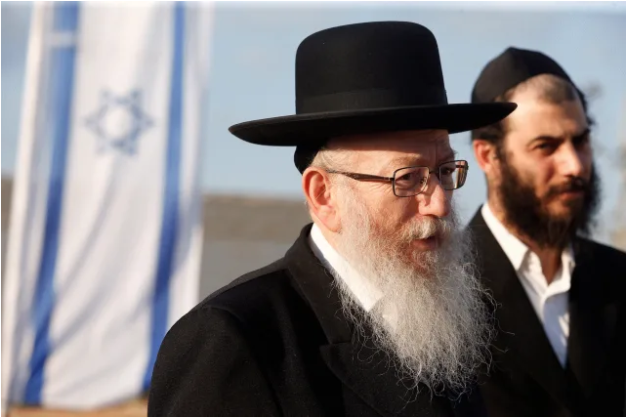 FILE: Health Minister Yaakov Litzman. Israeli police are investigating suspicions that Litzman obstructed justice by attempting to prevent the extradition Leifer, accused of sex crimes in Australia. Credit: Meged Gozani
FILE: Health Minister Yaakov Litzman. Israeli police are investigating suspicions that Litzman obstructed justice by attempting to prevent the extradition Leifer, accused of sex crimes in Australia. Credit: Meged Gozani
However, the new allegations in the Leifer affair hold promise that change is being felt, says Jewish Community Watch Executive Director Meyer Seewald. “We are inspired that in a community that has historically been so extremely insular, a dialogue about [alleged] sexual abuse and assault is finally taking place,” Seewald said in a statement.
Leifer’s prime accusers in Australia are the sisters Dassi Erlich, Elly Sapper and Nicole Meyer. They issued a statement on the new allegations: “Each new voice that rises above the fear of remaining silent is so valuable and important in helping to change the world into a better place. The more courage that we can bring out into the world, the more safe and just the world will become.”
Closed community
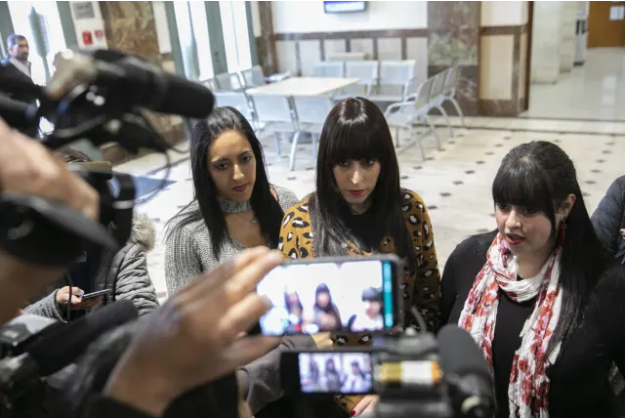 Australian women, Nicole Meyers, Dassi Erlich and Ellie Sapper speak to members of the media following a court hearing in the case of Malka Leifer at the District Court in Jerusalem March 6, 2019. Credit: Olivier Fitoussi
Australian women, Nicole Meyers, Dassi Erlich and Ellie Sapper speak to members of the media following a court hearing in the case of Malka Leifer at the District Court in Jerusalem March 6, 2019. Credit: Olivier Fitoussi
The Litzman development and the fact Leifer was able to flee Australia so quickly when allegations first surfaced against her — aided by members of her ultra-Orthodox school, according to an Australian judge who ruled in a related civil case in 2015 — speaks to what advocates describe as a culture of complicity inside the ultra-Orthodox world.
Haredi society is a highly insular one where ties with the secular authorities, as well as discussions about sexual issues, are almost taboo.
“In closed communities like the ultra-Orthodox establishment, protecting the community has been considered [of] higher importance than protecting those harmed by a sex abuser,” says Avigayil Heilbronn-Karlinsky, founder of Lo Tishtok (Hebrew for Thou Shalt Not Be Silent), an organization that works to raise awareness in the ultra-Orthodox community about sexual abuse.
“That is because, in part, the ultra-Orthodox public did not have an understanding of what sexual offenses even were,” she explains. “It’s not something that was talked about; it all took place under the cover of secrecy and darkness. The victims themselves usually felt they themselves had done something that was immodest, and that if they turned the person over to the secular authorities they would be committing chilul hashem,” she adds, referring to an immoral act committed in the presence of others.
In the ultra-Orthodox community, of which Heilbronn-Karlinsky is a member, the law of the land is regarded as secular, she explains, and deemed as “other,” even foreign and hostile. And in some communities, even reporting alleged crimes is seen as unacceptable because of the centuries-old prohibition of mesirah — which prohibits Jews from turning in other Jews to non-Jewish authorities for fear they would not be treated fairly. However, that said, Jewish tradition also maintains that protection should not be given to someone deemed dangerous to the community.
A recent fundraising effort to help Leifer, launched by a Hasidic rabbi, speaks to that sentiment of mesirah, with the Haredi public being asked to help “redeem a captive.”
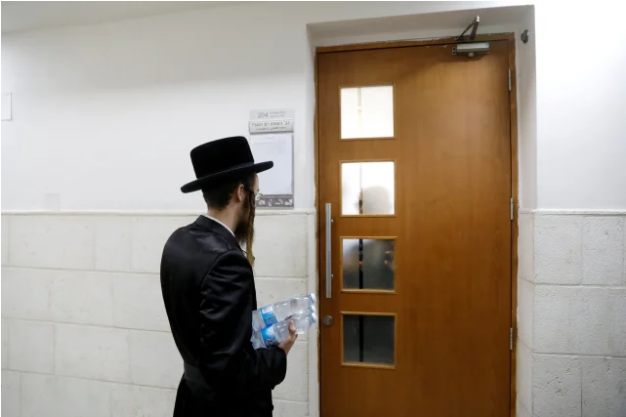 A relative of Malka Leifer stands outside the courtroom before Leifer's hearing at the District Court in Jerusalem February 18, 2019. Credit: RONEN ZVULUN/ REUTERS
A relative of Malka Leifer stands outside the courtroom before Leifer's hearing at the District Court in Jerusalem February 18, 2019. Credit: RONEN ZVULUN/ REUTERS
Protecting the institution
Yeshiva University’s Rabbi Yosef Blau, an expert on abuse within the ultra-Orthodox world, sees a parallel in how the Catholic Church handled child abuse cases for decades — including transferring pedophile priests to other parishes. In both settings, protecting the institution was paramount.
Blau says covering up for offenders or alleged offenders is more common if the accused is prominent in the community. Furthermore, he notes, another prohibition exacerbates the problem among the observant community: That of lashon hara (gossiping about others).
“Concern about lashon hara is used to silence the victim and his or her supporters,” Blau tells Haaretz. “Victims and their families are shunned. There is denial that abusers are usually chronic offenders, and it becomes possible to claim they have repented and won’t abuse again.”
 Pope Francis speaks during the last day of the four-day meeting on the global sexual abuse crisis, at the Vatican, February 24, 2019. Credit: VATICAN MEDIA/ REUTERS
Pope Francis speaks during the last day of the four-day meeting on the global sexual abuse crisis, at the Vatican, February 24, 2019. Credit: VATICAN MEDIA/ REUTERS
Advocates say ongoing coverage of the Leifer affair is helping to boost awareness about the matter. “People are fascinated and horrified by the case, and it’s putting a focus on the wider problem of [alleged] molesters using Israel to escape justice,” says Aaronson.
Ultra-Orthodox and Orthodox communities today have greater awareness about sexual abuse and the importance of identifying and preventing it, according to advocates who cite new education efforts in the community. These efforts include using teachers and camp counselors, lectures and creating culturally appropriate literature.
Manny Waks, a victim advocate and CEO of Kol v’Oz — which works to prevent child sexual abuse in the global Jewish community — welcomes these efforts. But he cautions that there is still a long way to go, citing the community’s insularity and ignorance about what abuse is and the trauma it inflicts on its victims.
“Also, offenders have a much easier time in the ultra-Orthodox world convincing their own communities that what they did in the past was in the past, and now they have done repentance. The community will say things like, ‘It was an aberration; there was inappropriate touching but not rape. They work to minimize it,” he says. Waks adds that ultra-Orthodox rabbis often believe it is not actually sexual abuse unless there is penetration.
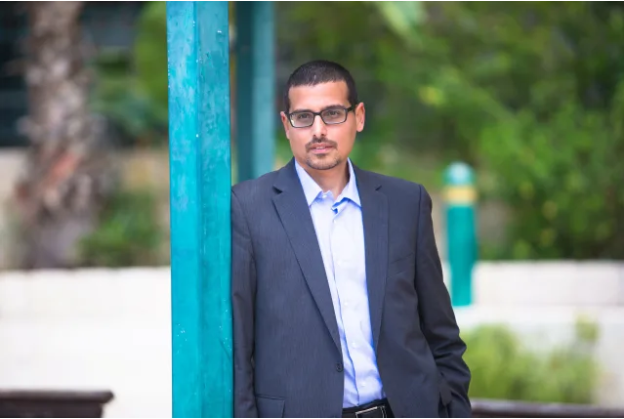 Manny Waks, advocate against child sex abuse in the Jewish community. Credit: נמרוד גליקמן
Manny Waks, advocate against child sex abuse in the Jewish community. Credit: נמרוד גליקמן
Community leaders will often approach advocates of victims and say an offender has done teshuvah (or teshubah) and deserves a fresh start. “But of course, the irony is that in every one of these scenarios, the offender [or alleged offender] has never once apologized to the victim or victims. So the idea of teshuvah is a joke,” says Aaronson.
Originally published at Ha'aretz.